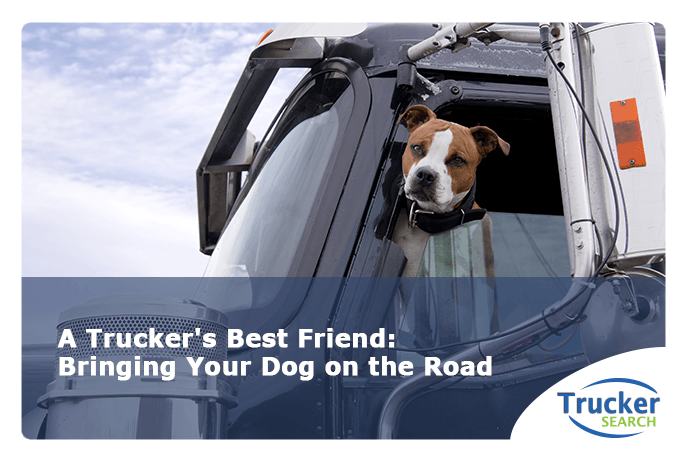Life on the road can be hard. The long hours, monotony of the highway, loneliness, being away from home, seeing only strangers for days or weeks at a time, all can make driving a big rig a difficult and stressful job. This is why it’s not uncommon to see couples on long hauls together to eliminate some of that loneliness that can set in.
This is also why people bring along their dogs. A dog can provide protection for the driver but mainly they tag along for companionship, for the love and comfort they bring, their familiar face and happy-to-see-you tail wag. Bringing a dog along on the road is bringing along a little piece of home, the wet nose and big, loving eyes piece of home.
Bringing your dog on the road has many benefits. Their undying love and companionship can relieve loneliness, depression, and anxiety, not to mention the direct health benefits they bring. It’s been proven that merely petting a dog releases “good feeling” hormones, reduces blood pressure and lowers your heart rate. Your dog needs exercise which means you’ll get exercise too whenever you stop to walk him.
Before recruiting your dog as your copilot, there are a few things to consider. If you’re an owner/operator, you’re the one who can make the decision to bring a pet but if you work for a trucking company, you’ll need to check with them first to see if it goes against their policies. Fortunately, many trucking companies understand how difficult long haul trucking can be on a person and will allow you to bring along a companion. However, they may have weight and breed restrictions and you may have to provide proof that your dog is current on their vaccinations.
Will your dog be happy on the road? Most dogs will adapt and simply be happy to be with their favorite person but for others, it may cause stress and anxiety that could affect their health. If this is the case, they would probably be happier at home.
Before You and Your Dog Hit the Road
Visit the Vet. Have a vet give your pet a thorough exam to make sure he’s fit for the job and this includes all vaccinations and any that may be recommended for the regions he’ll be traveling through.
Microchip Your Dog. If your dog gets away from you on the road, he may not be able to find his way back to you. Make sure your dog also has a tag on his collar that has your cell phone and microchip number on it.
Consider Pet Insurance. Vet bills are expensive and bringing your dog on the road may expose him to hazards he may not experience at home.
While on the Road with Your Dog
When you’re on the road with your dog, you’ll want to keep him safe and happy.
- Use a seat belt designed for the size of your dog. If you get into an accident, it may save his life. Often when a dog is in an accident, he is scared and confused and if not restrained will just run away from the accident. In an unfamiliar location, he may not find his way back. Even if you only have to stop quickly, he could fall or hit the dash and be injured, if not properly restrained. Also, a seat belt will keep your pooch from climbing down near your feet where he could cause an accident.
Some people prefer to keep their dogs in a hard or soft kennel while traveling. They can be secured on the passenger’s seat so your dog is near you but will keep them restrained.
- Secure anything that you don’t want to be chewed such as medications or food.
- Give him his own space with a dog bed and toys. Dogs are den animals and may crave the safety and security of their own den. A kennel to sleep in may provide them with that comfort.
- Always have fresh water on hand.
- Make sure your dog gets plenty of exercise. He needs outside time to run and stretch his legs. Some rest stops have dog exercise areas or you can map out dog parks along your route. Bringing your dog along may mean more stops.
Dogs are called Man’s Best Friend for a reason. They love their people steadfastly. Having your dog accompany you on the road can be a rewarding and comforting experience with one downside?if you never leave your dog behind, you won’t get that wagging-the-tail-so-hard-they-can-hardly-stand, sloppy-kiss greeting when you come home.


